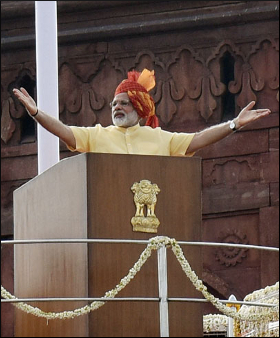|

|
Shared value an important lever in PM's vision of New India 2022
|
|

|
|
| Top Stories |
 |
|
|
|
Amit Kapoor | 16 Aug, 2017
On the 75th anniversary of the Quit India movement, Prime Minister Narendra Modi urged citizens to create a new India by 2022 by freeing the country from poverty, corruption, dirt, terrorism, casteism, and communalism. To fulfill this vision of a new India, it's important that all stakeholders come together and support the governments efforts on eradicating these evils.
To this effect, the role of the corporate sector is critical, and this gets accentuated by the fact that corporates hold significant sway on quality resources in the form of manpower, assets, technology et al.
Enterprises today need to think out of the box and start to embed the idea of social good as part of its strategy. The idea is to move beyond philanthropy, CSR investments and making social good as part of its business model. Embedding social good as part of your business model is the idea of shared value that Professor Michael Porter had as well talked about at the NITI Transformation Lecture Series recently.
Shared value is about creating a win-win situation for the company and the community. Shared value should not be confused with philanthropy or CSR. Shared value is about business strategy wherein the idea is to build scale and create an impact. This assertion should not be construed as a criticism for philanthropy though a call for further action by corporates.
Individual philanthropy has been part of India's culture since generations but has had limited impact on solving the problems at hand. What the country needs today are scalable solutions that create opportunities for livelihood for the population that is at the bottom of the income pyramid.
One of the successful examples of Shared value has been Gujarat Narmada Valley Fertilizer Company's (GNFC) Neem Project. One of the decisions made by the Prime Minister after assuming office in 2014 was the distribution of neem coated urea fertilisers. This has led to a systematic change within the distribution chain for urea wherein pilferage of urea is not possible for other industrial activity and as well has increased the yields and productivity for the farmers.
GNFC is an example of shared value where the company created a self-sustainable division for neem oil through backward and forward integration thereby generating livelihood opportunities for women, providing quality product in the market at affordable price points, thereby challenging the adulterated neem based products in the market. It created value for the community and also helped the company in better procurement of neem oil for its urea coating. In addition, GNFC as well created new business opportunities for neem based products by leveraging its distribution network and brand with the farmers. This was made possible by engaging women at the village level to collect neem seeds. This effort, which was enabled through self-help groups in itself created over 100,000 livelihood opportunities for people in rural areas.
Shared value initiatives such as this make a sustainable impact on the community and on poverty alleviation, rather than one time philanthropic activity. It is important that India Inc. plays a constructive role in creating a new India and looks at this as an opportunity and start thinking in different aspects of their business where they can integrate with the community. It could be forward linkage, backward linkage in the supply chain, skill development for the larger industry, better industrial relations practices among others. Considering the size and the geographic diversity of the country, it's important that apart from the large enterprises, even small and medium enterprises start to see shared value as an opportunity to create long-term scalable and sustainable impact.
The other enterprises that have created exceptional impact of similar nature are Mother Dairy, Godrej, ITC, HUL et al. What we need to learn from experiences of these enterprises is that by embedding the principle of shared value within the business models' corporates can create win-win scenarios for both the community and the company itself. Having said this, we should keep in mind that the shared value Strategy for each enterprise would be different that would be driven based on its its products, geography, customers and suppliers. Each organisation would need to look inward on where it can see synergy with community goals and based on that would need to initiate its own strategy.
If the enterprises start imbibing these principles within their strategy it is certainly possible to achieve the dream that Modi has. In short, it is about improving the quality of lives of the citizens of the country wherein we can boast of an India that is one of the most socially progressive geographies in the world.
(Amit Kapoor is chair, Institute for Competitiveness. The views expressed are personal. He can be contacted at amit.kapoor@competitiveness.in and tweets @kautiliya. Adarsh Kataruka, ceo, SoulAce has contributed to the article)
|
|
|
| |
|
|
|
|
|
|
|
|
|
|
|
|
|
|
| |
| Customs Exchange Rates |
| Currency |
Import |
Export |
US Dollar
|
84.35
|
82.60 |
UK Pound
|
106.35
|
102.90 |
Euro
|
92.50
|
89.35 |
| Japanese
Yen |
55.05 |
53.40 |
| As on 12 Oct, 2024 |
|
|
| Daily Poll |
 |
 |
| Do you think Indian businesses will be negatively affected by Trump's America First Policy? |
|
|
|
|
|
| Commented Stories |
 |
|
|
|
|
|
| |
|